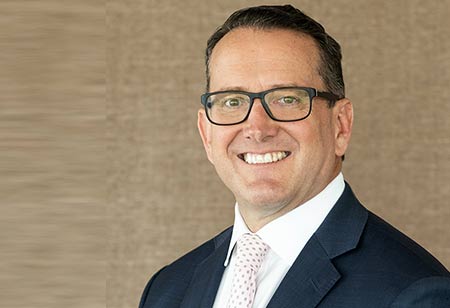How governments and businesses respond to the enormous challenges of a rapidly changing environment continues to be a topic of critical importance, both here in the U.S. and across the world. Financial Institutions today are in a strong position to help clients across industries with their transition plans, balancing the need to act urgently while recognizing that emissions cannot be eliminated overnight.
Globally our target must be to decarbonize as rapidly as possible and limit global warming to a temperature increase of no more than 1.5 degrees Celsius above pre-industrial revolution levels. A holistic view of our clients, their targets, and ambition is an important step in this journey, and this is why Transition Finance is a core focus for us at Standard Chartered.
Across the world, 35 billion metric tons of carbon dioxide was emitted into the atmosphere in 2021. We need to consciously transition from the global economy we have today, to the economy we aspire to have: one that minimizes carbon emissions and supports net zero ambitions. If we are going to achieve net zero by 2050, partnering with clients to finance their transition must become a part of the solution.
A key finding in Standard Chartered’s Just in Time report is that an estimated $94.8 trillion is needed to finance the transition of emerging markets to net zero by 2060. Access to financing is a significant barrier to reaching net zero for two-thirds of large companies surveyed by Standard Chartered. Closing the financing gap is therefore key to ensuring a just transition, particularly in the emerging markets that have not historically been the largest emitters of carbon.
“Access to financing is a significant barrier to reaching net zero for two-thirds of large companies surveyed by Standard Chartered”
Transition Finance enables our clients in these markets to gain access to the capital required to decarbonize their existing operations as part of a holistic climate transition strategy. This might also include supporting investments in clean technologies and renewables that are becoming increasingly essential to avert the worst outcomes of climate change.
At Standard Chartered, we use our Transition Finance Framework to determine which assets we finance genuinely to help move the global economy towards a net zero future. Eligible activities within the Framework are aligned with the IEA Net Zero Energy 2050 scenario, and the assessment process includes consideration of our clients’ targets and strategies to deliver real change on the ground.
To qualify for Transition Finance, an asset or project must meet three primary criteria: the activity must support a 1.5-degree trajectory; it must not interfere with the adoption of lower carbon alternatives; and it must meet the safeguards of our Environmental and Social Risk Management Framework (i.e. do no significant harm).
To ensure each asset financed by Standard Chartered is part of a larger decarbonization strategy, we also expect clients in high carbon emitting sectors (starting with carbon-based power generation, mining and metals, and oil and gas) to have a strategy to transition their business in line with the goals of the Paris Agreement. Ideally, we also want them to report their current greenhouse gas emissions - preferably in line with the Task Force on Climate-Related Financial Disclosures (TCFD).
The debate around the role of transition fuels continues. The decline in fossil-fuel production will not be linear and production of some fossil fuels may rise before it falls in our markets, (e.g. gas as it replaces coal in the short to medium term). With fuels like LNG or even hydrogen, we must also consider the means of production, transport, storage, and processing in determining how truly sustainable they are. Carbon capture technology will also increasingly be a tool for emission reduction, particularly for carbon-intensive industries.
Achieving our collective climate goals needs to be the highest priority, both to sustain global economic growth and for humanity to prosper. As public sentiment on climate accelerates and as regulators and governments add requirements like disclosure of greenhouse gas emissions, appetite to make tangible progress towards net-zero will only increase.
We recognize that the transition to a net-zero economy will require time, nuanced approaches, and adjustments as we go. But with a clear vision and a firm commitment to deliver change, we can support global efforts to limit carbon emissions for all communities.












